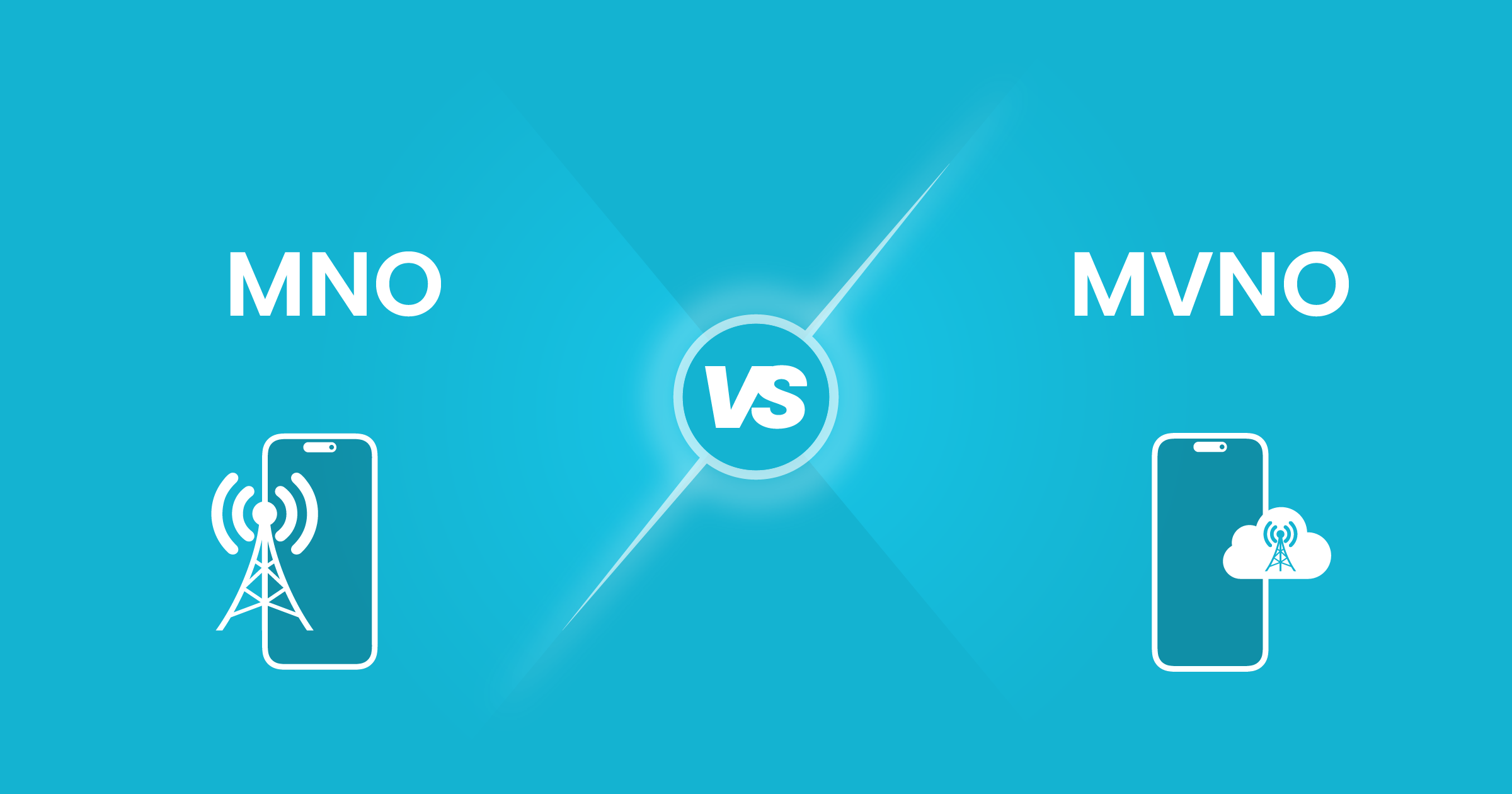MNO Vs. MVNO: The Differences You Should Know as a Business
Published: May 13, 2024

When it comes to mobile connectivity, there are two key players that shape the digital landscape: MNOs and MVNOs. MNOs own and control the infrastructure that fuels wireless services, while MVNOs take advantage of existing networks to provide tailored connectivity solutions. But what sets them apart? Here's everything you need to know.
What Is a Mobile Network Operator (MNO)?
A Mobile Network Operator (MNO) is a key player in the telecommunications industry, providing essential mobile communication services to consumers and businesses alike. MNOs own and operate the infrastructure needed to deliver wireless services, including radio network spectrum, core networks, and radio access networks. They typically own their own radio network infrastructure and hold radio network license.
What Are Mobile Virtual Network Operators (MVNO)?
Mobile Virtual Network Operators (MVNOs) are distinct entities in telecommunications as they function without owning the physical infrastructure of mobile networks. Instead, they use existing ones from MNOs to provide services to their customers. MVNOs essentially act as resellers of mobile services.
Unlike MNOs, MVNOs do not typically own their own spectrum licenses, including core networks and radio access networks. Instead, they rely on agreements with MNOs or other network providers to access services and offer connectivity to their customers. This arrangement allows MVNOs to enter the market without the significant investment required to build and maintain the framework.
MVNOs come in various forms, ranging from full MVNOs, which have more control over their operations and network elements, to light MVNOs, which have limited control and often rely heavily on the services provided by the host network. Some MVNOs operate under a branded reseller model, marketing services under their own brand while relying on the MNO.
Key Differences Between MNO Vs. MVNO
Understanding the differences between MNOs and MVNOs is crucial for businesses when selecting a mobile service provider that best fits their needs and requirements.
One significant difference between MNOs and MVNOs is that MNOs usually own and control network access to their framework, whereas MVNOs do not own theirs but rather lease it from MNOs or other network providers.
MNOs have their own client base and offer services directly to subscribers, providing customer care, sim provisioning, and other office services. This direct relationship with customers gives MNOs more control over the customer experience and allows them to tailor services to meet specific needs.
1. Ownership and Control
An MNO typically owns and controls its network infrastructure, including base stations, core networks, and radio access networks. This gives them direct control over network operations and management.
MVNOs, on the other hand, do not own one. Instead, they rely on agreements with MNOs or virtual network aggregators (MVNAs) to access network services and sell connectivity to their customers.
2. Access to Operator's Airtime
MNOs have direct access to the airtime unlike MVNOs; instead, they purchase it in bulk from MNOs or MVNAs and then sell access to their customers.
3. Business Model
MNOs operate under a traditional business model, providing services directly to customers, managing subscriber relationships, and handling customer support.
MVNOs often adopt a reseller or branded reseller model, marketing services under their brand while relying on the host network.
4. Control Over Customer Base
MNOs have direct control over their customer base, managing subscriber relationships and offering services directly to consumers.
MVNOs do not directly own their customers; they rely on agreements with MNOs to access customers.
4. Scope of Operations
MNOs typically operate on a larger scale, serving a wide range of customers and offering a variety of mobile services, including voice, data, and messaging.
MVNOs may focus on specific niche markets or customer segments, offering customized plans tailored to their target audience.
Get in Touch With Our Experts
Streamline your efforts and centralize your channels with Dexatel's all-in-one platform. Talk to our experts and get all your questions answered.
What Is a Mobile Virtual Network Enabler (MVNE)?
A Mobile Virtual Network Enabler (MVNE) facilitates the operations of MVNOs by providing essential framework and support resources. While MVNOs rely on agreements with MNOs or virtual network aggregators (MVNAs), MVNEs play a big role in allowing MVNOs to efficiently manage their operations.
MVNEs offer technical support and expertise to MVNOs. This includes assistance with network integration, troubleshooting, and optimization.
What Are MNEs (Mobile Network Enablers)?
MNEs encourage both MNOs and MVNOs to optimize their operations and enhance service delivery. Acting as facilitators, MNEs provide a suite of technical solutions aimed at bolstering the efficiency and effectiveness of network operations.
FAQs: Understanding MNOs and MVNOs
1. What is the key difference between MNO/MVNO?
Mobile Network Operators typically own and operate their network infrastructure, while an MVNO (Mobile Virtual Network Operator) leases network access from MNOs or virtual network aggregators (MVNAs).
2. What is the role of a Mobile Virtual Network Aggregator in the MVNO ecosystem?
MVNAs enable MVNOs to access network services without owning physical infrastructure. They act as intermediaries between MVNOs and MNOs.
3. How does Light MVNO differ from Full MVNO?
Light MVNOs have limited control over network elements and rely heavily on the host network. Full MVNOs, on the other hand, have more autonomy and control over their operations.
4. What is the importance of controlling access in the MNO-MVNO relationship?
MNOs control access to their network infrastructure. This control allows MNOs to manage network capacity and maintain quality of service.
5. Can MVNOs enable IoT (Internet of Things) projects?
Yes, MVNOs can support IoT projects by providing connectivity for IoT devices and solutions.
6. What licenses are required to operate a cellular network?
Radio network licenses are required to operate a cellular network, granting operators legal permission to utilize radio frequency spectrum for telecommunications purposes.
7. How do MNOs and MVNOs differ in terms of business support?
MNOs typically offer direct support to their own subscribers, including customer care and billing. MVNOs may rely on MNOs or MVNEs (Mobile Virtual Network Enablers) for support.
